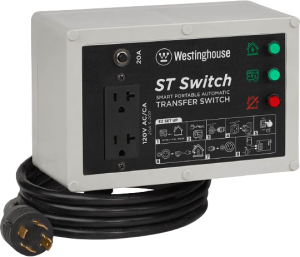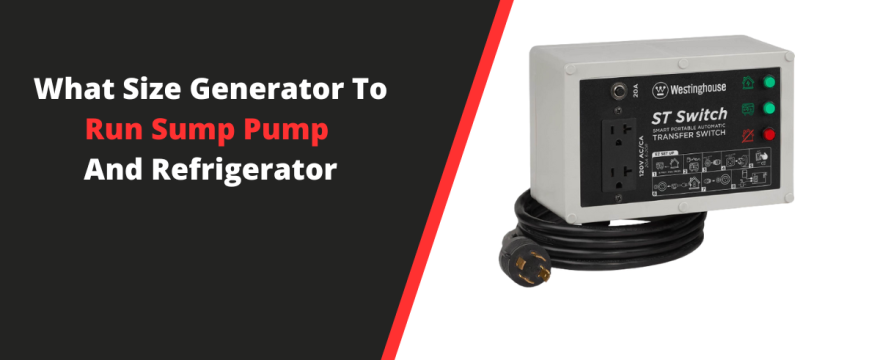We’re excited to share with you everything you need to know about what Size Generator To Run Sump Pump And Refrigerator! If you’re looking for a reliable solution to keep your basement dry during power outages, then you’re in the right place.
At its core, a sump pump generator is a backup power source for your sump pump. When the power goes out, your sump pump will no longer work, leaving your basement at risk of flooding. That’s where a generator comes in! It provides the power your sump pump needs to continue functioning, ensuring your basement stays dry.
Here’s everything you need to know about sump pump generators:
How Do Sump Pump Generators Work?
Sump pump generators work by providing a source of backup power when your main power source fails. The generator is connected to your sump pump, and when the power goes out, the generator kicks in automatically. This ensures that your sump pump continues to function as normal, even when the power is out
What are The Benefits of Using a Sump Pump Generator?
The benefits of using a sump pump generator are clear: they provide peace of mind that your basement will remain dry during power outages. Here are some of the main benefits:
- Protects against flooding: With a sump pump generator, you can be confident that your basement will remain dry even during e
 xtended power outages.
xtended power outages. - Easy to use: Sump pump generators are designed to be easy to use and require little maintenance.
- Automatic operation: The generator kicks in automatically when the power goes out, so you don’t have to worry about manually turning it on.
- Increased home value: Having a sump pump generator installed can increase the value of your home, making it an excellent investment.
How to choose the right sump pump generator?
Choosing the right sump pump generator can be a daunting task, but with a little research, you can find the perfect solution for your needs. Here are some things to consider when choosing a sump pump generator:
- Power output: Make sure to choose a generator with enough power output to run your sump pump.
- Fuel type: Decide whether you want a generator that runs on gasoline, propane, or natural gas.
- Size: Choose a generator that is the right size for your home and your sump pump.
- Automatic vs. manual operation: Decide whether you want a generator that kicks in automatically or one that requires manual operation.
key features:
Are you in the market for a generator for your sump pump? If so, you’ll want to consider the various features available to ensure you select the right one for your needs.
Let’s take a closer look at some of the key features to consider when selecting a generator for your sump pump:
When it comes to running essential appliances like a sump pump and refrigerator during a power outage, it’s important to choose the right size generator. Here’s a detailed look at what to consider when choosing a generator to run your sump pump and refrigerator:
- Power output: The first thing to consider is the generator’s power output. For a sump pump, you’ll need a generator that can produce at least 1,000 watts of continuous power. For a refrigerator, you’ll need a generator that can produce at least 600 watts of continuous power.
- Starting watts: In addition to continuous power, it’s important to consider the starting watts required by both appliances. A sump pump can require up to 2,000 starting watts, while a refrigerator can require up to 1,800 starting watts. Make sure the generator you choose can handle these peak power demands.
- Run time: You’ll also want to consider the run time of the generator. A generator that can run for 8-12 hours on a full tank of gas is usually sufficient for most power outages.
- Fuel source: Generators can run on gasoline, propane, or diesel. Gasoline is the most common fuel source and is widely available, but it can be more expensive and has a shorter shelf life than propane or diesel. Propane is a good option for those who want a cleaner-burning fuel with a longer shelf life. Diesel generators are typically more fuel-efficient but can be more expensive upfront.
- Portability: Finally, consider the portability of the generator. A smaller, more portable generator may be easier to move around and store, but may not have enough power output to run both appliances. A larger generator will be more powerful but may be more difficult to move around.
Overall, choosing the right size generator to run your sump pump and refrigerator during a power outage will depend on your individual needs and circumstances. Make sure to consider the power output, starting watts, run time, fuel source, and portability when making your choice.
Are you thinking about investing in a generator for your sump pump? While there are certainly some benefits to having a backup power source, it’s important to consider both the pros and cons before making a decision.
[su_row][su_column][su_box title=”Pros” style=”default” box_color=”#1E90FF”][su_list icon=”icon: check” icon_color=”#1E90FF”]
- Keeps your basement dry: The main benefit of a sump pump generator is that it can help keep your basement dry during power outages, which is essential for preventing water damage.
- Easy to use: Sump pump generators are typically designed to be user-friendly and require little maintenance.
- Automatic operation: Many sump pump generators have the automatic operation, which means they will turn on automatically when the power goes out, without you needing to do anything.
- Increased home value: Having a sump pump generator installed can increase the value of your home, as it’s an attractive feature for potential buyers.
[/su_list][/su_box][/su_column][su_column]
[su_box title=”Cons” box_color=”#DC143C”][su_list icon=”icon: ban” icon_color=”#DC143C”]
-
- Cost: Sump pump generators can be expensive, and may not be worth the investment for everyone.
- Noise: Generators can be noisy, which can be a concern if you live in a quiet neighborhood or have close neighbors.
- Fuel storage: If you choose a generator that runs on gasoline, propane, or diesel, you will need to store fuel on your property, which can be a safety concern.
- Maintenance: While sump pump generators are generally easy to use, they do require some maintenance, such as regular oil changes.
[/su_list] [/su_box][/su_column][/su_row]
Conclusion:
In conclusion, there are both pros and cons to using a generator for your sump pump. While it can certainly provide peace of mind during power outages, it’s important to carefully consider the costs, noise, fuel storage, and maintenance requirements before making a decision. Ultimately, the choice will depend on your individual needs and circumstances.
Related Buyer’s Guides:
- List of 10 Best Generators for RV
- List of Top 6 Best Portable Inverter Generators
- List of Best Quiet Generator
- List of 10 Best Generators with Inverter
- List of Best Solar Generators
- List of 6 Best Inverter Generators
- List of 6 Best whole House Generator
- List of 7 Standby Generators
- List of Best Duel Fuel Generator
- List of how-big-a-generator-do-i-need-for-my-house
- List of small-generators-for-camping
- Liat of Quitest-inverter-generator-reviews

Leave a Reply